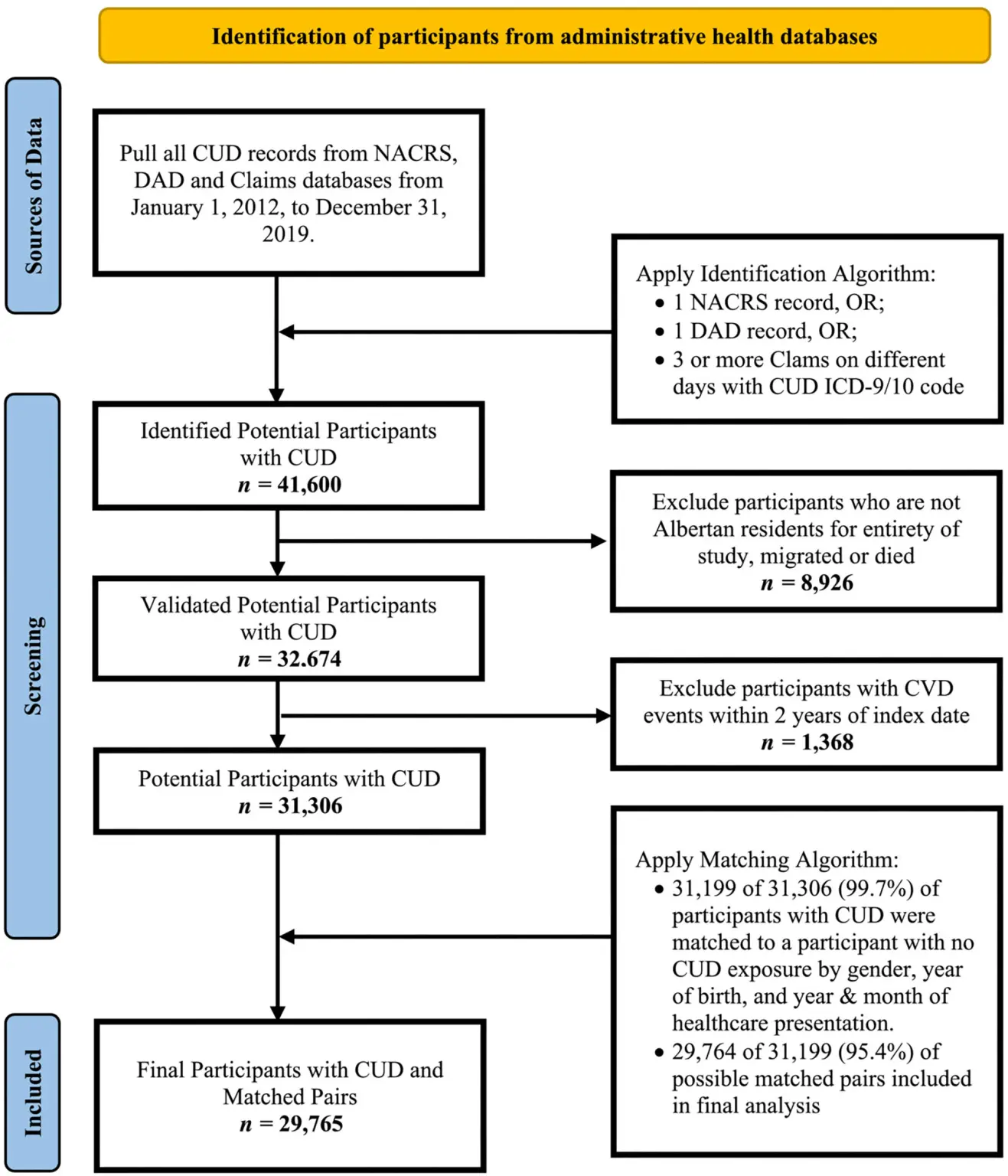News
Marijuana Addiction Linked To 60% Higher Risk Of Cardiovascular Issues, Study Finds
(CTN News) – Recent medical research has unveiled a troubling connection between marijuana addiction and an elevated risk of cardiovascular problems, including heart attacks and strokes.
A study published in the peer-reviewed journal ‘Addiction‘ has reported a staggering 60% higher risk of experiencing initial cardiovascular events among adults struggling with cannabis addiction.
While this research doesn’t definitively establish a causal link, it sheds light on the potential health risks associated with cannabis misuse.
The Study’s Findings
The study, which involved an eight-year analysis of data from approximately 60,000 Canadians, suggests that individuals grappling with cannabis use disorders face a significantly higher risk of cardiovascular issues compared to those without such disorders.
Lead author Dr. Anees Bahji emphasized that while the study doesn’t conclusively prove that cannabis use disorder causes adverse cardiovascular events, it does indicate a strikingly elevated risk among Canadians with this disorder.
Between January 2012 and December 2019, the study found that 2.4% of people with cannabis use disorder experienced their first cardiovascular disease event, in contrast to only 1.5% in the control group.
These events encompassed peripheral vascular disease, heart attacks, and strokes.
Even individuals initially considered healthy due to the absence of known medical conditions, prescriptions, and infrequent doctor visits still faced a 1.4-fold higher risk of developing heart issues.
This heightened risk may be attributed to these participants’ self-perceived health, potentially causing them to overlook early signs of declining cardiovascular well-being.
Implications and Existing Research
This study aligns with existing research highlighting potential health risks associated with frequent cannabis use. Earlier this year, research presented to the American College of Cardiology also indicated that regular cannabis use is linked to an increased risk of heart disease.
Additionally, individuals who use cannabis regularly have a greater likelihood of developing coronary artery disease compared to non-users.
Considering these findings, healthcare professionals advise individuals using cannabis to disclose this information to their healthcare providers.
It’s crucial for medical practitioners to be aware of patients’ substance use habits to assess and manage their overall health risks effectively.
Heart disease is a global leading cause of death, responsible for roughly one in every five fatalities in the United States. According to the Centers for Disease Control and Prevention, someone succumbs to heart disease approximately every 33 seconds.
In light of these statistics, understanding the potential cardiovascular risks associated with marijuana addiction is vital for public health awareness and effective prevention strategies.
Signs of Marijuana Use Disorder According to the CDC
The CDC (Centers for Disease Control and Prevention) has identified the following signs as indicative of marijuana use disorder:
- Using more marijuana than intended: Consuming larger quantities of marijuana than initially planned or intended.
- Trying but failing to quit using marijuana: Making efforts to stop or reduce marijuana use without success.
- Spending a lot of time using marijuana: Devoting a significant amount of time to obtaining, using, or recovering from the effects of marijuana.
- Craving marijuana: Experiencing a strong desire or urge to use marijuana.
- Using marijuana even though it causes problems at home, school, or work: Continuing to use marijuana despite it leading to negative consequences in one’s personal life, education, or employment.
- Continuing to use cannabis despite social or relationship problems: Persisting with marijuana use despite it causing conflicts or difficulties in relationships or social interactions.
- Giving up important activities with friends and family in favor of using marijuana: Sacrificing or neglecting meaningful social activities and relationships in favor of marijuana use.
- Using marijuana in high-risk situations, such as while driving a car: Engaging in risky behaviors, like operating a vehicle, under the influence of marijuana.
- Continuing to use marijuana despite physical or psychological problems: Using marijuana despite it causing physical or mental health issues.
- Needing to use more marijuana to get the same high: Developing tolerance to marijuana, which requires increasing the amount consumed to achieve the desired effects.
- Experiencing withdrawal symptoms when stopping marijuana use: Suffering from withdrawal symptoms, such as irritability, insomnia, and cravings, when attempting to cease marijuana use.
These signs collectively indicate the presence of marijuana use disorder, a condition where an individual’s marijuana consumption leads to significant negative consequences in various aspects of their life. If you or someone you know is struggling with these signs, it’s essential to seek help and support from healthcare professionals or addiction specialists.
Conclusion
The recent research highlighting an increased risk of cardiovascular problems among individuals struggling with marijuana addiction underscores the importance of comprehensive healthcare assessment and prevention strategies.
While more research is needed to definitively establish the causal link between cannabis use disorder and cardiovascular events, these findings serve as a stark reminder that substance misuse can have serious health consequences.
Public health efforts should focus on educating individuals about the potential risks associated with marijuana addiction and promoting informed decision-making regarding its use.































